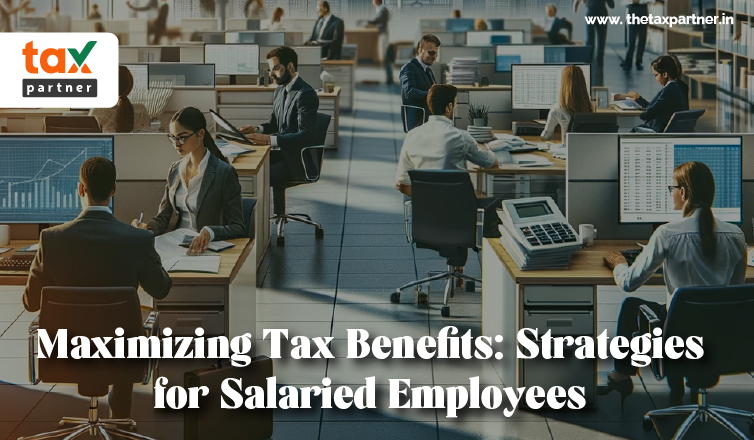Tax Benefits For Salaried Employees
Maximizing Tax Benefits: Strategies for Salaried Employees
Author – Tanvi Thapliyal
Many people find it challenging to navigate the complexities of income tax, especially if they are salaried employees. When it comes to income tax planning, it's important to not just meet your legal requirements, but also to make the most of your financial resources in order to reduce your tax burden and increase your savings. It is important for salaried employees to have a good understanding of the different provisions and options provided by the Income Tax Act, such as deductions, exemptions, and allowances. This knowledge is essential for effectively managing taxes.
This article aims to give you a thorough understanding of income tax planning that meets the needs for salaried employees. The article will provide insights on understanding the different components of taxable income, as well as tips and strategies to help salaried individuals effectively plan their income taxes. It will cover topics such as tax-saving instruments, optimising deductions, and managing the complex landscape of income tax planning. By following the strategies mentioned in this article and keeping detailed records, salaried employees can not only make sure they are following tax laws but also improve their financial situation by reducing taxes and increasing savings.
What is meant by taxable income
Taxable income refers to the part of your income that is eligible for income tax. As a salaried employee, there are several components that you should be aware of when it comes to taxes. Understanding these components can help you make better plans and possibly lower your tax liability. Here’s a breakdown
-
salary income.
These include your basic salary, house rent allowance (HRA), special allowances, and any other allowances. But not all parts of your salary are subject to full taxation. for example:
Your basic salary is fully taxable based on your tax slab.
-
House Rent Allowance (HRA).
If you are living in a rented house, you may be eligible for partial or full exemption under certain conditions for the House Rent Allowance (HRA).
-
Leave Travel Allowance (LTA)
-
Other Allowances
-
There are certain special allowances that you should know about. Some of these allowances are taxable, which means you have to pay taxes on them. However, there are also some allowances that may be exempt from taxes, but only up to a certain limit. For example, the transport allowance and education allowance fall into this category.
-
Income from Other Sourcesincludes any earnings or revenue that you receive from sources other than your primary source of income. This can include things like interest earned from savings accounts, dividends from investments, rental income, or any other form of income that is not derived from your main job or business.
-
You can earn interest from savings accounts, fixed deposits, or income from renting out property. It also includes any additional income that doesn't fall into the categories of salary, business/profession, capital gains, or income from other sources.
-
Perquisites
also known as "perks," are additional benefits provided by an employer. These can include things like a company car, subsidised loans, accommodation, or stock options. It's important to note that these perks are considered part of your taxable income. The taxability of perquisites depends on their nature and the rules that apply for the assessment year.
-
Bonuses and incentives
bonuses or performance incentives that you receive from your employer are considered taxable income under the category of 'Income from Salaries'.
-
Retirement Contributions and Benefits
Up to a certain limit, contributions to the Provident Fund are not subject to taxation. However, it's important to note that any interest earned on EPF (Employee Provident Fund) above a specific limit is subject to taxation. When you retire or resign, any gratuity you receive is tax-exempt up to a certain limit. The specific limit depends on factors like the type of employer you had and the number of years you worked.
Here's how you can calculate taxable income for salaried employees
What is the aggregate income?
-
summarise the income you receive from various sources, including salary, house property, capital gains, business/profession, and any other sources.
-
You can deduct allowances such as HRA, LTA, and others according to the Income Tax Act.
deductions:
-
You can take advantage of deductions available under Section 80C for investments such as ELSS, PPF, and NPS.
-
you can also claim deductions under Section 80D for medical insurance and Section 80E for education loan interest, among others.
-
To calculate your taxable income, you need to apply exemptions and deductions. The resulting figure will be your gross taxable income.
Exemptions Under Section 80 C Income Tax Act
Section 80C of the Income Tax Act, 1961, is widely used by individuals and HUFs (Hindu Undivided Families) in India to save on taxes. You can deduct up to INR 1.5 lakh from your total income each financial year, which will lower your taxable income and the amount of tax you owe.
Now, let's explore how you can make the most of this section:
-
Equity-Linked Savings Scheme (ELSS).
-
ELSS funds are mutual funds that invest in a variety of stocks and have a mandatory holding period of 3 years. Investing in them can potentially lead to higher returns and also provide tax benefits.
-
Investments in ELSS are eligible for a tax deduction under Section 80C, which provides a tax benefit.
-
The Public Provident Fund (PPF) is a popular investment option.
-
PPF, which stands for Public Provident Fund, is a long-term investment option supported by the government.
-
It provides tax-free interest, making it an attractive choice for many investors.
-
The maturity period is 15 years, but it can be extended in blocks of 5 years.
-
You can enjoy a tax benefit when you contribute to a PPF account.
-
The interest earned and the maturity amount from the PPF account are tax-free.
-
The National Pension System (NPS)
-
It is a government-backed retirement savings scheme.
-
NPS, which stands for National Pension System, is a retirement savings scheme that allows individuals to save money over a long period of time while they are employed.
-
It is a voluntary programme that encourages systematic savings.
-
You can enjoy a tax benefit by making contributions to the National Pension Scheme (NPS). These contributions are deductible under Section 80C of the Income Tax Act.
-
You can also get an extra deduction for investments up to INR 50,000 under Section 80CCD(1B), in addition to the limit of INR 1.5 lakh.
-
Life insurance premiums are the payments you make for your life insurance policy.
-
Life insurance premiums are payments made for insurance policies that cover you, your spouse, or your children.
-
You can benefit from tax deductions by deducting the premiums under Section 80C. However, in order to receive the tax benefit, there are certain conditions that need to be met. For policies issued after 1 April 2012, the premium should not exceed 10% of the sum assured.
-
Fixed Deposits
-
Tax-Saving Fixed Deposits (FDs) are a type of investment that can help you save on taxes.
-
These fixed deposits are offered by banks and have a lock-in period of 5 years.
-
Investments in tax-saving fixed deposits (FDs) are eligible for a tax benefit. You can claim a deduction under Section 80C for these investments.
-
Payment for children's tuition fees.
-
The tuition fees cover the cost of full-time education for two children in India.
-
You can claim a tax benefit for the fees you paid to any registered educational institution in India under Section 80C. Excluding donations or development fees.
-
Home Loan
-
When it comes to paying off your home loan, one important aspect is the repayment of the principal amount.
-
When you take out a housing loan to buy or build a home, you'll need to repay the amount you borrowed for the actual property itself. This is called the principal component of the loan.
-
You can benefit from tax deductions by claiming the principal repayment amount as a deduction under Section 80C.
Other ways to optimize your tax benefits
Understanding and exploring these deductions and exemptions can have a big impact on your tax planning strategy. They can help lower your taxable income.
Let's take a closer look at how you can effectively use these sections:
-
Consider investing in health insurance under Section 80D.
-
This coverage includes premiums paid for health insurance for yourself, your spouse, dependent children, and parents.
-
The deduction limit for individuals below 60 years is up to INR 25,000, while for senior citizens it is up to INR 50,000.
-
You can also claim a deduction for insurance of parents. If your parents are below 60 years old, you can claim INR 25,000. But if your parents are senior citizens, you can claim INR 50,000.
-
Preventive Health Check-up package allows you to have regular check-ups to maintain your health. You can avail this service within the limit of INR 5,000.
-
first-time homeowner Benefits
-
Benefits of the NPS: Section 80CCD(1B)
-
There is an extra deduction available for investing in NPS (National Pension Scheme) of up to INR 50,000.
-
This deduction is in addition to the limit of INR 1.5 lakh under Section 80C.
-
80DDB, deduction for medical treatment.
-
You can claim a deduction for expenses you've paid for the treatment of specified diseases for yourself or your dependents.
-
If you're below 60 years old, you can claim up to INR 40,000, and if you're a senior citizen, you can claim up to INR 1 lakh.
-
Reinvesting your capital gains.
-
If you want to avoid paying taxes on the capital gains you make from selling property, it's a smart move to reinvest in eligible options.
-
There is a section called Section 54 that provides an exemption on capital gains from selling a residential house if the money is invested in another residential property, but there are certain conditions that need to be met.
-
You can invest the gains from the sale in bonds issued by either the National Highways Authority of India (NHAI) or the Rural Electrification Corporation (REC) within six months. These bonds have a lock-in period of 5 years.
Compliances abiding which assures maximum tax benefit
-
Advance Tax
Advance tax is when you pay a portion of your yearly taxes ahead of time, before the end of the financial year. The tax is also commonly referred to as "pay-as-you-earn". This system is created to make it easier for people to pay their taxes. It allows taxpayers to spread out their payments over several months instead of having to pay a large sum all at once at the end of the year.
Who should be responsible for paying advance tax?
-
If a taxpayer's estimated tax liability for the year exceeds INR 10,000, it is mandatory for them to fulfil this requirement.
-
People who are salaried, freelancers, businessmen, and corporates are included in this category if their tax liability, after TDS (Tax Deducted at Source), exceeds INR 10,000.
The payment due dates are as follows:
Individual taxpayers are required to pay the advance tax in Four installments throughout the financial year.
-
On the 15th of June, you will need to pay 15% of your advance tax liability.
-
On the 15th of September, you need to pay 45% of your advance tax liability, which is calculated cumulatively.
-
On the 15th of December, you will need to pay 75% of your advance tax liability, which is calculated cumulatively.
-
The due date for paying 100% of the advance tax liability, cumulatively, is on the 15th of March.
-
Self-assessment tax.
The self-assessment tax refers to the remaining tax amount that you need to pay on your assessed income, after considering the TDS and advance tax, before submitting your income tax return.
What is the process?
-
Calculate the tax liability based on the applicable income tax slabs and rates.
-
Subtract the TDS and advance tax already paid from your total tax liability.
-
If there's a balance tax liability, pay the self-assessment tax. This needs to be done before filing your income tax return.
-
You can make the payment online through the official tax department website or at designated banks make sure to choose the right assessment year and payment type (self-assessment tax) when making the payment.
Documents necessary to avail tax benefits
-
Receipts and invoices
-
Make sure to hold onto your monthly salary slips, which provide all the information about your salary, allowances, deductions, and taxes withheld.
-
If you want to claim House Rent Allowance (HRA) exemption, make sure to keep rent receipts that are signed by your landlord.
-
medical bills
-
If you want to claim deductions under Section 80C for the tuition fees you paid for your children's education, you will need to provide the receipts.
-
If you have made donations that are eligible for tax deductions under Section 80G, you can request donation receipts.
-
Remember to keep proofs of your investments in tax-saving instruments like ELSS, PPF, NPS, and tax-saving FDs.
-
Bank statements and passbooks are important documents to keep track of your financial transactions. They provide a record of the money going in and out of your bank account. It's beneficial to regularly review your bank statements and passbooks to ensure that all transactions are accurate
-
Home Loan Statements are documents that show how much you have paid towards the principal and interest on your home loan. These statements are important for claiming deductions under Sections 80C and 24.
-
Statements of Interest Income: These are statements that display the amount of interest you have earned from your savings accounts, fixed deposits, and other similar sources.
-
Documents related to Capital gains refer to the profits made from selling or buying assets like property or shares. These profits are used to calculate capital gains.
-
Investment Documents
-
Documents, which include the sale deed, purchase deed, and registration documents for the properties you own.
-
Mutual Fund Statements that show the details of your investments in mutual funds, including ELSS (Equity Linked Savings Scheme).
-
Insurance Policies: the policy documents for life insurance, health insurance, and other insurance policies.
-
Education Loan Documents: Loan documents and interest certificates for claiming deductions under Section 80E.
-
NPS Documents - NPS Contribution Statements are documents that display the contributions made to the National Pension System.
-
Some other relevant documents:
-
copy of the HRA declaration you submitted to your employer if you're claiming HRA exemption.
-
Form 16/16A is a TDS certificate that is issued by your employer or other deductors.
-
If you have paid advance tax during the financial year, make sure to keep the challans as evidence of your payment.
-
If you have paid self-assessment tax before filing your return, make sure to keep the challan as proof.
Conclusion
It's important for salaried employees to engage in effective tax planning in order to effectively manage their finances. Individuals can minimise their tax liabilities and maximise their savings by understanding the different components of taxable income and taking advantage of provisions such as deductions and exemptions. It's really important to have detailed documentation when filing taxes to make sure everything goes smoothly and to follow all the regulations.
Moreover, if you seek help from TaxPartner , we can offer personalised guidance to help you make the most of tax-saving opportunities and overcome any complexities. By engaging in proactive planning and seeking professional support, salaried employees can effectively secure their financial future and successfully achieve their long-term goals.
FAQ’S
What are the key tax-saving options available to salaried employees?
Explore various tax-saving avenues such as investments under Section 80C (e.g., PPF, ELSS, NSC), health insurance premiums under Section 80D, and house rent allowance (HRA) exemptions.
How can I maximize benefits under Section 80C?
Allocate investments wisely across eligible avenues like EPF, PPF, life insurance premiums, and mutual fund SIPs to optimize tax savings while securing your financial future.
Can I claim tax benefits for home loan repayments?
Yes, both the principal repayment (under Section 80C) and the interest paid (up to a certain limit) can be claimed as deductions, helping you reduce your taxable income.
Are there any deductions available for rent payments?
Yes, if you're living in a rented accommodation and receiving HRA as part of your salary, you can claim exemptions based on the rent paid and HRA received, subject to certain conditions.
How can TaxPartner assist me in maximizing tax benefits?
TaxPartner offers personalized tax planning services tailored to your specific financial situation. Our experts can help you identify tax-saving opportunities, optimize your investments, and ensure compliance with tax laws.
What documents do I need to avail of tax benefits?
Keep documents such as investment receipts, health insurance premium receipts, rent receipts, and home loan statements handy to substantiate your claims during tax filing.
Can I claim tax benefits for expenses incurred on education and medical treatment?
Yes, expenses like tuition fees for children's education (under Section 80C) and medical insurance premiums (under Section 80D) are eligible for tax deductions, providing additional savings.
Is there a limit to the amount I can save through tax benefits?
While there are caps on individual deductions under various sections, prudent tax planning can help you maximize savings within the allowable limits.
What are the consequences of non-compliance with tax laws?
Non-compliance can lead to penalties, interest payments, and even legal repercussions. It's essential to stay informed and ensure adherence to tax regulations.
How often should I review my tax-saving strategies?
It's advisable to review your tax-saving strategies annually and adjust them based on changes in your financial situation and tax laws to optimize your savings.



